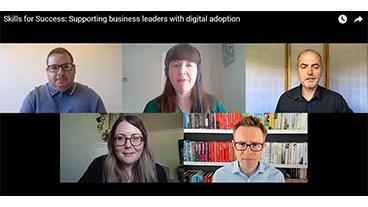You are here
- Home
- Webinar highlights best practice tech adoption for SMEs
Webinar highlights best practice tech adoption for SMEs

Digital transformation has been hugely accelerated by the Covid-19 pandemic. But several key elements need to be in place in order for that transformation to happen successfully: digital skills, leadership and management expertise, and business leaders who understand the potential of technology and are willing and able to invest in the right technologies and skills.
The Open University (OU), in partnership with the not-for-profit movement Be the Business, has just published a new report called Skills for success: Supporting business leaders with digital adoption. At the same time, the two organisations hosted a webinar by the same name, exploring the challenges and opportunities facing SMEs around digital adoption.
The webinar discussed some of the key findings from the report around skills development, staff recruitment and retention, apprenticeships and flexible training. It was split into three sections: key findings from the report, digital adoption in a post-pandemic world and how SMEs are developing the skills needed for success.
Learning expert Martin Couzins hosted the panel discussion. Joining him were Jane Dickinson, Digital Skills Lead at the OU, Anthony Impey, CEO at Be the Business, Jemma Waters, Lead of Responsible Transformation at Lloyds Banking Group, and JohnPaul Wright, Network Operations Center Manager at Systal Technology.
Some of those key findings are that:
- Covid-19 has caused an uptick and acceleration in technology adoption across a range of business areas
- Business leaders report high levels of confidence in tech adoption, but this may be exaggerated
- Significant skills gaps exist across all areas of digital adoption, and amongst business leaders and employees
- There are mixed attitudes to the value of training, and relatively limited appreciation of technology among SMEs
On a positive note, the report found that the pandemic has made business leaders much more likely to invest in digital skills, both for themselves and for their employees. Jane said, “this is certainly a welcome development but given the pace of change and the existence of a skills gap before the pandemic started, we do need to upskill and reskill even more individuals to keep up.”
For Anthony, three things really stood out from the report findings. The first is the pace of change and the opportunities this offers SMEs. The second is the lack of deep knowledge of digital tools and their value. “It points to a very urgent need for us to focus on developing the skills of small business leaders in order to drive the use of technology within their businesses.” Third, is the need to ensure the workforce has the relevant tech skills.
Fewer than a fifth of business leaders think they have all the technical skills necessary to successfully adopt technology and yet when asked what they plan to do about the skills gap, only 50% plan to address it in the next 12 months.
Anthony Impey, CEO at Be the Business
Despite the accelerated pace of transformation, Jemma thought many SMEs still struggle with knowing what digital means for them. She said it’s vital that they get the advice and support they need to make the right decisions over skills development and technology purchases to help them and the wider economy recover from the effects of Covid-19.
Small businesses are the lifeblood of our economy. They are the innovative forces, they are the challengers, they’re doing brilliant things across all sectors.
Jemma Waters, Lead of Responsible Transformation at Lloyds Banking Group
The biggest challenges for Glasgow-based Systal Technology during the pandemic have been around managing, recruiting and onboarding staff remotely and keeping the workforce engaged. JohnPaul said training has and continues to be key to the organisation’s success. “It’s about identifying the right training to make sure it adds value,” he said. “Continuous improvement is a massive thing for us.”
Download the Skills for Success report and watch the webinar on demand by filling in the form below.
Watch webinar
Fields marked with * are mandatory.
Find out how we can help your organisation
Please contact us to speak to one of our business team advisors.
Not on our mailing list?
Sign up to receive regular emails that are full of advice and resources to support staff development in your organisation.